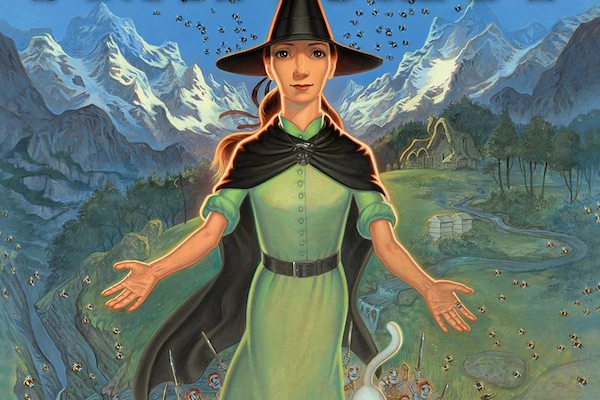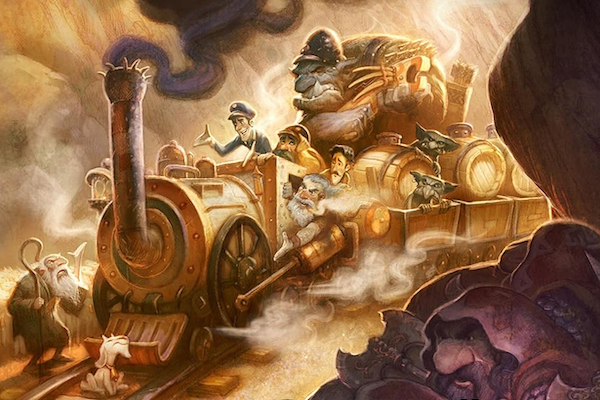I do wish I could banish winter on my own schedule, though.
Summary
The winter gets worse and worse and all Tiffany can do is help Annagramma get better, and use the cornucopia to make sure there’s enough food to see people through; all the witches are running ragged trying to keep their villages alive through the bitter cold. The Wintersmith has finally completed a body and knows what it is to be a man. Granny wakes Tiffany one day and tells her she should go home and be with her people, and that she thinks she expected too much of the girl, thinking she’d come into Summer’s power. Except, she points out that Tiffany did make an oak sapling, and tells her that she suspects Tiffany will be stopping by Miss Treason’s cottage on her way home; Tiffany realizes that Granny knew what Tiffany and the other girls had been doing all along, and had probably planned it that way. Tiffany goes to Miss Treason’s and finds notes on her grave that villagers are leaving to get her help. The Wintersmith shows up, but Annagramma appears in full stereotypical witch garb (she bought the whole Boffo catalogue) to bat him away from Tiffany. She loads Tiffany onto her own broom—as Tiffany is a bit delirious from panic and lack of sleep—and sends her home.
Granny sends the Feegle to train Roland to be a Hero for the story, and to send him to the Underworld to fetch the Summer Lady. Tiffany continues her journey home and stops briefly at Mrs. Umbridge’s to sleep; she dreams of the Summer Lady telling her that she’s ruined everything. When she wakes, Mrs. Umbridge is there and she’s got all the mail for Tiffany that’s been held up, including three letters from Roland and a very expensive paint box. Tiffany makes it the rest of the way home while Granny and Nanny send the Feegles to their task. Once Tiffany is home she feels more herself; she gets to see her family, and feels the ground beneath her feet, and she paints with her new paint box. She knows that people from the Chalk will be asking for her help soon, and it feels like a good day. The Feegle show up in Roland’s room and realize that he doesn’t have any practical fighting experience. They bring him into the armory and get into a suit of armor so that he has someone to practice against. At home, Tiffany’s mother is confused about her inability to use magic to do housecleaning. Roland stands up to his aunts and pauses his fight training to see his father—if he doesn’t see the man every day, his father forgets who he is.
Wentworth, Tiffany’s brother, catches a very large pike from the river, and Tiffany cleans it out for supper the following day. As she finishes cleaning it, she goes to remove the lure and finds it’s actually her silver horse. The Wintersmith knows where she is, and she will have to face him, here, in her home. But first, she finds her father so they can see to their flock of sheep. And with that, we catch up to the start of the book: Tiffany has been taken by the Wintersmith and wakes in a palace he has made for her. Tiffany tries to cow him, but he’s getting better at being a man, and insists that he is keeping her safe from death here. The Feegles get Roland kitted out and are sending him to the Underworld to find the Summer Lady. He encounters bogles, and only manages to survive the encounter because he’s too scared to run. Rob tells him that’s alright, and they make it all the way to the ferry, where Death is waiting to take them across. (Death is not happy to see the Feegle again.) Roland gets rid of his sword because the Feegle admit it’s no use against the bogles. They tell him he’ll have to kiss Summer to wake her; Roland gets to her and she looks just like Tiffany.
The Wintersmith has finally worked out that Tiffany is not the Summer Lady. He promises to bring summer to the Chalk to make Tiffany happy and then they will be happy. Roland retrieves the Summer Lady and fights off the bogles with a sword made of light that he creates in his own head, that is never too heavy. Tiffany knows that the Wintersmith cannot be human because he constructed himself according to the folk song but cannot understand the last three lines because they are not things to build himself from, but attributes he cannot possess. She kisses him and brings down the sun, ending the story. The Summer Lady comes to retrieve her crown from Tiffany and means to give her a reward, but Tiffany refuses: Witches don’t accept payment. The Summer Lady shows Tiffany the beauty and terror of summer, warning her to fear it as much as winter. Tiffany visit Nanny Ogg to tell her the whole story, slips in to see that Annagramma is getting on alright, then heads to Granny Weatherwax’s, and tries to call her on the set-up with Annagramma. Granny doesn’t react. She asks about Tiffany’s new ring, made from the nail the Wintersmith used to become human. Then she brings Tiffany to the Morris dance in Lancre, and Tiffany asks her how to move pain out of a body so she can help the Baron. Granny tells her she’s playing with fire, but seems pleased at Tiffany’s choices. Tiffany sees Summer in the dance, and gives the iron ring to the Fool.
Commentary
Tiffany spends this story in the throes of growing up, and the whole conceit is framed as a romance… but ultimately ends with compassion. And this is true for the previous story as well, with the hiver, but it’s more personal here, of course. Because the Wintersmith believed he was in love with her, but also because she understands better what his mistake was in trying to make himself human, the aspects he would always lack.
There’s one line from the Wintersmith that is underplayed, but actually hit me the hardest, when he says that he and Tiffany will be together and happy: “Happiness is when things are correct.” The gaping flaw in that thought, partly being that plenty of people do think that’s the definition of happiness, but also that imposing “correctness” on the idea of happiness is in itself utterly backward. Ouch.
I also do love the moment when the Wintersmith palace realm creates that dress for Tiffany and we get this:
She was shocked, then angry. Then she wished she had a mirror, felt guilt about that, and went back to being angry again. And resolved that if by chance she did find a mirror, the only reason she’d look in it would be to check how angry she was.
Just the extremely relatable feeling of not having time for this nonsense! But being young and curious and kind of wishing that you did.
The idea that Tiffany’s formative romance, or formative idea of romance (because the Wintersmith is a concept more than a sentient being) is fundamentally tragic seems important as well. Whether it’s because she’s a witch, or because she’s more aligned to Esme Weatherwax’s manner of doing the job, it’s a clue to readers about the sort of adult Tiffany will become. While I appreciate that it feels entirely right for Tiffany, I always want a bit more of Nanny’s perspective on things like this. Just a little, for balance.
There’s the “reckoning” language that gets more prominent as the story finishes, with Tiffany thinking the word more and more frequently whenever she is angry, and I love how dramatic it is? Tiffany’s anger is always her clearest emotion, too, which is so refreshing to see both for the rarity of this being allowed to young women in fiction, but also for how it focuses her. When Tiffany is angry, she knows what she needs, what she has to do. Anger provides clarity. Which is a commonality among Pratchett’s protagonists, but I particularly love the way he executes it in her.
And the way these books seamlessly weave the Feegle plots in, much in the manner Pratchett uses with the university wizards: They’re here to cause mayhem and make jokes, but they’re so enjoyable that you’re never really sorry about it?
These endings with Tiffany and Granny, though… they bring the story back around to its heart, yet again. These moments when you can see how proud Granny is of Tiffany, how comforted she is in knowing that someone like her will be around when she’s gone, and the genuine childlike joy we get from Esme when she shares things with the girl. It anchors these stories in something far deeper than simple coming-of-age mechanics. Being a witch is so much more than that, after all.
Asides and little thoughts:
- FTW being for “Friendly To Witches” is excellent. And the “witch sign” to let people know about it is, of course, similar to the Hobo Code, a way that travelers used to leave each other notes made of symbols to help each other find safe places to rest and eat.
- Orpheo and Euniphon are, of course, just the Disc version of Orpheus and Eurydice, which gets reenacted by Roland here when he retrieves the Summer Lady. That’s why Rob tells him not to look back, of course, the tragic mistake Orpheus makes when enacting his own rescue.
- “He was great at air sword.” The entire bit about Roland’s difficulty with the heaviness of real swords… as a person who adores stage combat, but doesn’t have fully working wrists, and is also a bit small for your average broadsword, I feel all of Roland’s complaints in my bones. Literally.
- Rob on this particular Underworld: ’This one used tae be called Limbo, ye ken, ‘cuz the door was verra low.” How dare he make that joke. It is so good.
Pratchettisms:
The woods weren’t silent. They were holding their breath.
A witch ought never to be frightened in the darkest forest, Granny Weatherwax had once told her, because she should be sure in her soul that the most terrifying thing in the forest was her.
Before, he hadn’t been apart; he’d been a part, a part of the whole universe of tug and pressure, sound and light, flowing, dancing. He’d run storms against mountains forever, but he’d never known what a mountain was until today.
You couldn’t make a picture by pouring a lot of paint into a bucket. If you were human, you knew that.
Okay, one of them was a cheese that rolled around of its own accord, but nobody was perfect.
It was easier here, and because it was easier it was worse, because he was bringing winter into her heart.
There are times when everything that you can do has been done and there’s nothing for it now but to curl up and wait for the thunder to die down.
We’ve got a break into the new year, but we’ll be back in 2024 with Where’s My Cow?












